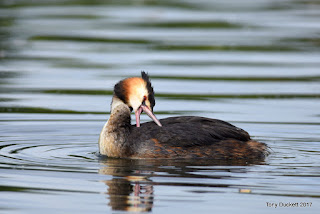Great crested Grebes in Regent's Park 2017
We used to have as many as 6 pairs nesting in the park but in the last few years this has dropped to 2 or 3 pairs. This is due to several factors; not enough suitable sites to build a nest, competition from Coots, predation of eggs by Terrapins, not enough suitable sized fish, possible predation of chicks by gulls and disturbance by people in rowing boats.
This species used to winter away from the park, however the milder winters we have nowadays has allowed the odd bird to stay until the first hard frost causes the lake to freeze over. Birds would normally begin arriving in the park from late February.
By spring this year there were 2 pairs present one on the Bandstand Island and the other on Heron Island. The first pair built a nest on the western side of the Bandstand Island and all was well until the first boats of the year were hired out. After a short period they started building on the eastern end , their usual site, this site failed due to heavy rain causing the lake to rise flooding the nest. This pair were determined and with 2 weeks they were trying again this time under an elder bush on the NE corner of the island. The birds had laid at least 4 eggs when another pair turned up one Sunday morning. I watched as the new pair approached the Bandstand Island and encroached on the 1st pairs territory. The 2 males then got into a fight which was very violent, with the birds actually fighting on top of the nest, resulting in the loss of the eggs.
The Heron Island birds by this time had been sitting for a while and weren't far off the hatching date when a member of the public spotted a terrapin on the nest. Terrapins as well as eating eggs like to sun themselves on sheltered platforms, grebes nests can be ideal for this. As with the Bandstand pair this pair eventually laid again, this time they were successful and they hatched 2 eggs, the young of which are doing well, staying normally in the chained off area. While they were being successful the 2 pairs by the Bandstand Island have managed to get along and are at present raising families of 3 and 2 chicks.
Below are some images taken today of the 2 families on the boating area of the lake.
We used to have as many as 6 pairs nesting in the park but in the last few years this has dropped to 2 or 3 pairs. This is due to several factors; not enough suitable sites to build a nest, competition from Coots, predation of eggs by Terrapins, not enough suitable sized fish, possible predation of chicks by gulls and disturbance by people in rowing boats.
This species used to winter away from the park, however the milder winters we have nowadays has allowed the odd bird to stay until the first hard frost causes the lake to freeze over. Birds would normally begin arriving in the park from late February.
By spring this year there were 2 pairs present one on the Bandstand Island and the other on Heron Island. The first pair built a nest on the western side of the Bandstand Island and all was well until the first boats of the year were hired out. After a short period they started building on the eastern end , their usual site, this site failed due to heavy rain causing the lake to rise flooding the nest. This pair were determined and with 2 weeks they were trying again this time under an elder bush on the NE corner of the island. The birds had laid at least 4 eggs when another pair turned up one Sunday morning. I watched as the new pair approached the Bandstand Island and encroached on the 1st pairs territory. The 2 males then got into a fight which was very violent, with the birds actually fighting on top of the nest, resulting in the loss of the eggs.
The Heron Island birds by this time had been sitting for a while and weren't far off the hatching date when a member of the public spotted a terrapin on the nest. Terrapins as well as eating eggs like to sun themselves on sheltered platforms, grebes nests can be ideal for this. As with the Bandstand pair this pair eventually laid again, this time they were successful and they hatched 2 eggs, the young of which are doing well, staying normally in the chained off area. While they were being successful the 2 pairs by the Bandstand Island have managed to get along and are at present raising families of 3 and 2 chicks.
Below are some images taken today of the 2 families on the boating area of the lake.
This grebe appears to have come off worse as there is blood at the base of his bill














































Comments